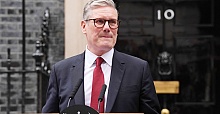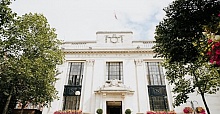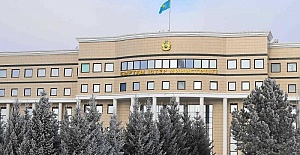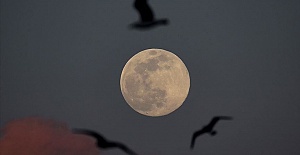By Thomas Grove MOSCOW, July 17 (Reuters) - Kalashnikov, which makes the machine guns used in conflicts from Afghanistan to Africa, and Almaz-Antey, one of Russia's highest profile firms that produced arms for Syria's President Bashar al-Assad, were among eight weapons makers named by the U.S. Treasury.
Targeted by some of the toughest measures taken by the White House in the latest round of sanctions, the firms will be cut off from dollar trade, after U.S. institutions were forbidden from carrying out transactions with them.
The move could hit Russia's standing as the world's second largest arms exporter.
AK-series machine guns are ubiquitous across eastern Ukraine, where separatists are also armed with an array of rocket-propelled grenades and anti-tank missiles of the type produced by Russian firms.
A day after the United States announced its latest sanctions, Ukraine's government accused militants in the east of the country of shooting down a Malaysian passenger jet, killing all 295 people aboard.
The other firms named in the U.S. sanctions list are: Bazalt, Kret radio-electronic technologies, Sozvezdie, NPO Mashinostroyenia, KBP Instrument Design Bureau and Uralvagonzavod.
"The arms firm sanctions were among the only old school sanctions there were," said Samuel Charap, a senior fellow at the International Institute for Strategic Studies.
"These are actual sanctions, they are blanket asset freezes and transaction bans."
The sanctions complicate the dollar-based exports of the firms and any potential imports of component parts, Charap said, as dollar transactions are carried out with a U.S.-based correspondent bank.
"Russia could easily evade these sanctions, but nonetheless it will complicate matters and force them to take extra steps with extra costs to their business," he said.
Russia's arms firms, which exported more than $13 billion last year, carry an emotional weight for Russians who see in them the scientific and military might that once made the Soviet Union a superpower on a par with the United States.
As part of plans to revamp Russia's fighting forces, President Vladimir Putin has promised to pour $600 billion into the arms industry to revamp its weaponry and catch up with Western defence technology.
LOOPHOLES
Putin's plans are unlikely to be affected, observers say. Exports account for only a part of the firms' sales, the lion's share of which often come from the army's procurement budget or government funding.
"All their funding for modernisation comes from Russian banks or the Russian government, so here this round of sanctions may not hurt that much," said independent defence analyst Thomas Golts.
Funds for research and design aimed at helping Russia catch up with Western arms technology also show no sign of slowing, and Prime Minister Dmitry Medvedev promised more money to support the defence budget after the sanctions were announced.
"The Americans did not stop the rearmament programme of Russia's army and navy and did not undermine the export potential of our defence industry," Dmitry Rogozin, Medvedev's deputy in charge of the country's defence industry, wrote on Twitter.
"Washington's sanctions against Russia's leading defence enterprises are illegal and only show the dishonest competition of the United States on the arms market," he wrote.
The United States' arms exports made up 30 percent of global arms sales between 2008-12, according to the Stockholm International Peace Research Institute.
One potential loophole that Russian defence firms may be able to use in their exports is their relationship with state arms export monopoly Rosoboronexport, which oversees individual firms' sales to various countries - from Indonesia to India.
Rosoboronexport itself was not sanctioned.
The sanctions however may wipe out a deal Kalashnikov signed at the beginning of this year to deliver 80,000 to 200,000 guns a year for the next five years to U.S. importer Russian Weapons Company.
"We're still trying to determine what will happen with our partners and contracts," said Kalashnikov spokeswoman Yekaterina Bonni.
The sanctions' real danger to the Russian arms firms lie in their ability to force other European arms firms to follow suit and freeze the numerous areas of partnership crucial to Russia's modernisation project.
Russia has already sent seamen to train on two French-built Mistral helicopter carriers which Moscow bought in a 2.1 billion euro contract meant to give Russia a peek into what gives Western technology its edge. France pressed ahead with the deal despite pressure from Washington.
Other contracts with Europe include German Rheinmetall's partnership with a Russian company to build a combat training centre in western Russia.
"The real problems are yet to come," said Ruslan Pukhov, director of Moscow-based defence think tank CAST.
"If this is just the beginning, a prelude and Washington continues to pressure Europe into tangible sanctions that cut off cooperation between Russian and European defence firms, that could be dangerous," he said.
Aiming at Russia's iconic arms firms, U.S. sanctions pack a punch
17 Temmuz 2014 Perşembe 10:54
reads.
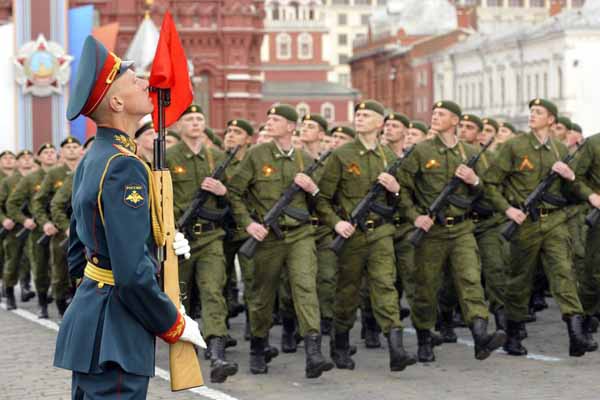


 Prime Minister Keir Starmer's 2025 Easter message
Prime Minister Keir Starmer's 2025 Easter message After Nesil Caliskan a by-election will be held in Jubilee ward in Enfield
After Nesil Caliskan a by-election will be held in Jubilee ward in Enfield Publishing the analysis, Labour’s Cllr Ergin Erbil said Everybody in Enfield deserves basic rights
Publishing the analysis, Labour’s Cllr Ergin Erbil said Everybody in Enfield deserves basic rights Gaza-Israel conflict Statement from Cllr Ergin Erbil, Leader of Enfield Council
Gaza-Israel conflict Statement from Cllr Ergin Erbil, Leader of Enfield Council The European Union called on Turkey to uphold democratic values
The European Union called on Turkey to uphold democratic values Turkish citizens in London said Rights, Law, Justice
Turkish citizens in London said Rights, Law, Justice The Council of Turkish Cypriot Associations Geneva response letter
The Council of Turkish Cypriot Associations Geneva response letter Sustainable Development and ESG, Will This Become the Course for Turkic World
Sustainable Development and ESG, Will This Become the Course for Turkic World The 'Prince of Paris' has impressed in his first EuroLeague season
The 'Prince of Paris' has impressed in his first EuroLeague season Saran Media And Euroleague Basketball Extend Media Rights Partnership for Four More Years
Saran Media And Euroleague Basketball Extend Media Rights Partnership for Four More Years Will Rangers be Jose Mourinho’s next victim?
Will Rangers be Jose Mourinho’s next victim? Jose Mourinho's Fenerbahce face Rangers on Thursday
Jose Mourinho's Fenerbahce face Rangers on Thursday Barclays has become the biggest UK lender so far to cut mortgage rates
Barclays has become the biggest UK lender so far to cut mortgage rates THE SPRING STATEMENT EXPLAINED, UK ECONOMIC OUTLOOK AND GROWTH FORECASTS
THE SPRING STATEMENT EXPLAINED, UK ECONOMIC OUTLOOK AND GROWTH FORECASTS Launch of Made in Enfield gift shop to celebrate local artists and designers
Launch of Made in Enfield gift shop to celebrate local artists and designers Trial used smart Wi-Fi sensors for live building occupancy data to optimise
Trial used smart Wi-Fi sensors for live building occupancy data to optimise

